Papaya is one of the healthiest fruits in the world…for humans.
But can cats eat papaya?
Cats can safely eat very small amounts of papaya so long as it’s well-cleaned, organic, and seed-free.
Larger amounts can cause digestive upset such as diarrhea or stomach aches.
Papaya is not toxic to cats, unlike grapefruit.
Contents
Is Papaya Safe For Cats To Eat?
In most cases, yes, cats can eat papaya without experiencing any negative side effects.
Even so, papaya should never make up a big part of your feline friend’s diet since cats are obligate carnivores, so they should mainly eat meat-based products or protein-rich and moderately fat commercial cat foods.
Compared to other fruits, papaya is healthier and generally less risky to feed to cats.
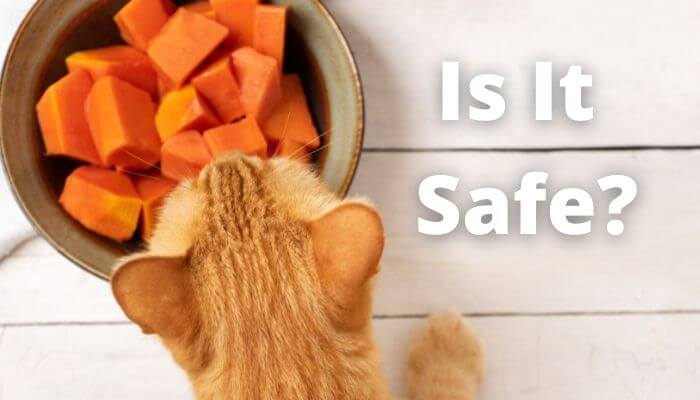
In most cases, cats do not show any interest in papaya.
However, some seem to like to nibble on a piece or two, especially if you leave the fruit on the table.
Cats can’t taste sweet things.
Their taste buds are not the same as ours.
For this reason, cats find various foods interesting mainly due to their smell and their consistency.
Some cats might be interested in trying out ice cream, for example, but that’s only because it has a higher percentage of fat.
If you ever ate papaya before, you probably know that its consistency does not resemble that of an apple.
It’s not as hard, nor is it as chewy. It’s softer and easier to eat, so its texture could appeal to some cats.
While you are allowed to give papaya to your feline companion every now and then, do keep in mind that cats should not have fruit on a regular basis.
Treats should make up about 5 to 7% of a healthy cat’s diet.
Possible benefits of feeding your cat papaya
Papaya is one of the healthiest fruit out there.
It has a number of excellent nutrients, such as the following:
- Vitamin A
- Vitamin E
- Vitamin C
- Folate
- Potassium
Did you know that 152 grams (the equivalent of a small-sized papaya) also has about 1 gram of protein and as many as 3 grams of fibre?
The downside is that it also contains as many as 15 grams of carbohydrates, so cats should never have a whole papaya fruit.
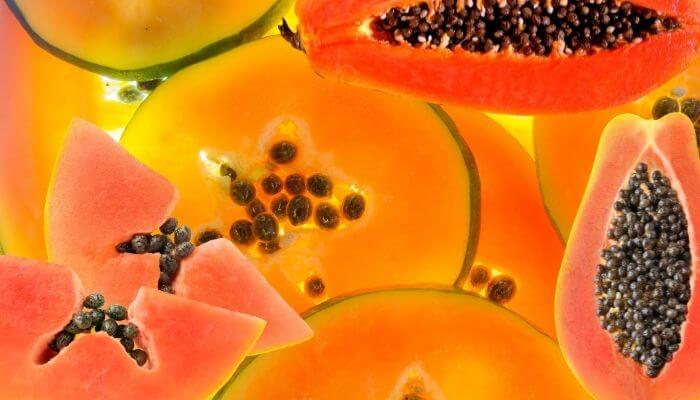
It is rich in lycopene, an antioxidant that is believed to be capable of preventing some forms of cancer.
For example, lycopene can also be found in tomatoes and grapefruit, two fruits that cats should never eat.
Besides potentially being able to prevent cancer, lycopene can additionally prevent some types of degenerative diseases, including dementia – a condition that geriatric cats can suffer from.
The antioxidants in papaya can fight inflammation and even improve your cat’s heart health, as well as digestion.
While it is richer in carbs compared to pumpkin, papaya can help a constipated cat go potty easier.
Potential risks
All fruits present a number of risks when being fed to cats. If your pet already suffers from a mild form of diabetes, avoid giving them any type of fruit — including papaya.
Since papaya contains a pretty decent amount of fibre, it can cause digestive imbalances in cats that are already suffering from IBD or IBS.
If your cat has been experiencing diarrhoea or vomiting, refrain from giving her any fruit whatsoever.
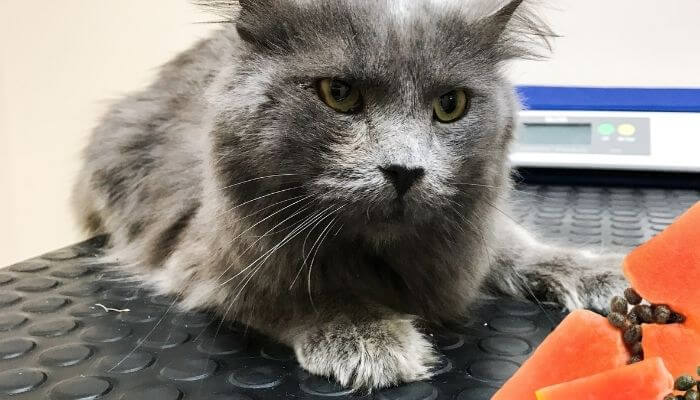
The same rule applies to kittens and senior cats, who might also be suffering from various chronic conditions.
Large amounts can be dangerous, so keep this treat to a minimum.
Your cat doesn’t need papaya in order to survive.
They simply need their regular cat food, which should be composed of no-grain varieties.
You can also make your own cat food at home under the guidance of your veterinarian if that’s something you might be interested in.
What kind of papaya is safe for cats?
As you might know, various fruits and veggies are exposed to dangerous chemicals such as pesticides or weed killers.
Some of these substances can be so powerful that they can penetrate the peel and get into the other layers, which you’d feed to your cat.
For this reason, we recommend buying only organic papaya. It’s considerably safer than any other types out there.
If you can grow your own papaya, that’d be even better as you would know what you’ve sprayed your trees with.
Also Read:
How to serve papaya to your cat
Cats don’t like eating very large things, so cutting up the fruit into small and edible pieces is the right way of going about things.
But before serving it to your cat, you should clean the outside as thoroughly as possible.
Peel the fruit and make sure that there are no visible contaminants on its surface.
Unlike other fruits, papaya shouldn’t come in contact with the ground, but you have no control over the way the goods were transported, for example.
Some people even use eco-friendly dishwashers to clean their fruit.
Can cats eat papaya seeds?
No.
The answer to this question is very clear as fruit seeds can be extremely dangerous for cats (and for other pets, too!).
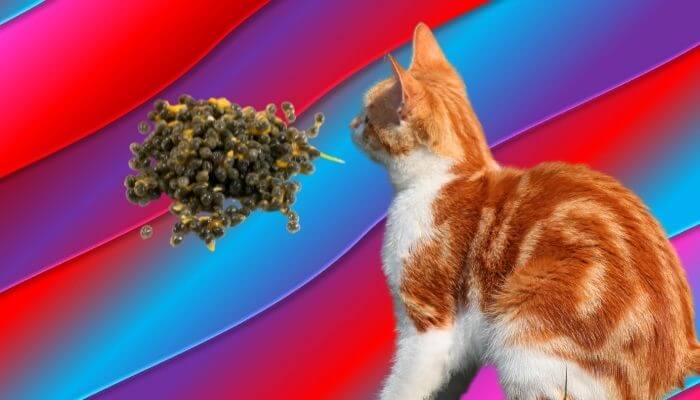
On the one hand, they pose a choking hazard due to their size.
On the other hand, fruit seeds can contain a number of substances that can put your feline companion’s health (and even life) at risk.
Apple seeds, for example, contain cyanide, and while you might have eaten one or two before, that amount of poison isn’t going to do anything to a human due to their size.
But for a tiny cat, one or two fruit seeds can sometimes be deadly.
Is dried papaya bad for cats?
Yes.
Dried fruit (and that includes dried papaya) is bad as the sugar quantity in it is much higher than what you’d find in a regular, fresh papaya.
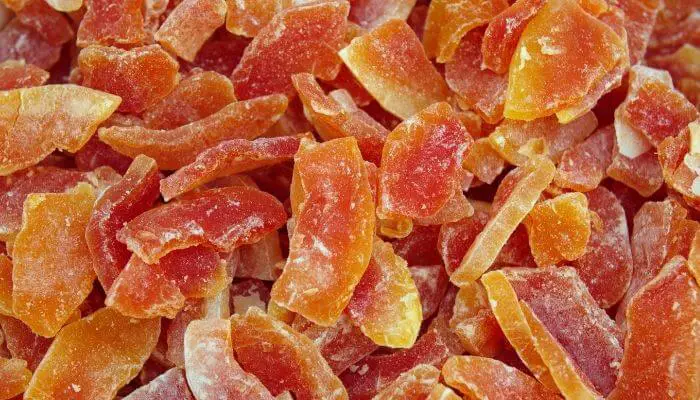
Sugar doesn’t have a place in any cat’s diet – they don’t need any at all.
But it can be extremely detrimental to a cat who suffers from a pancreatic disease or is at a high risk of developing diabetes due to obesity, for example.
How much papaya is safe?
It depends on a number of factors.
If your cat has various conditions that make feeding fruit a no-go, there’s no point in you risking your feline friend’s health.
Your cat’s size also has a say as to how much papaya is safe or not.
If she’s a bigger breed, a bigger piece might be just as safe, but there is no point in overdoing it.
One to two teaspoons of papaya per week are considered safe and can be given to cats as treats.
Don’t give your pet fruit every day as it can cause a spike in their blood sugar.
Are there papaya products for cats?
There are roughly two types of products that contain papaya extracts and that are made for pets.
Some are waterless shampoos, which can simply be sprayed on your cat’s body instead of giving them a bath.
Most shampoos and deodorisers in this category contain artificial papaya scents, though.
The second type of papaya products that have become relatively popular in the past years are papaya enzymes.
The main ingredient in them is papain, a plant enzyme extracted from the fruit. This enzyme is said to improve a cat’s digestion.
However, several more studies have to be performed before the efficiency and safety of such products is proven.
Therefore, we recommend avoiding them for the time being.
Is the papaya tree poisonous to cats?
If you have papaya trees in your garden, you might be wondering whether the leaves might be toxic to cats or not.
A 2014 study found them not to be toxic to humans, but there hasn’t been enough research done on pets.
You should avoid allowing your cat to come in contact with plants whose toxicity you aren’t informed on.
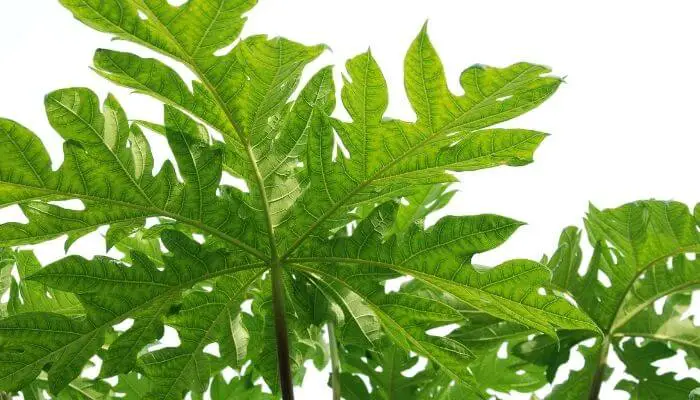
There are many house plants that are toxic to cats such as lilies, some trees can also be risky.
You can always plant cat grass in a pot so that your cat always has something green to nibble on.
Conclusion
Papaya is usually safe to feed to cats. Only small amounts are acceptable, especially since cats are obligate carnivores.
Papaya is rich in a number of antioxidants, from vitamin C to vitamin A, and it also contains moderate amounts of fibre.
If you have any doubt whatsoever about giving this fruit to your pet, make sure to talk to your veterinarian beforehand.

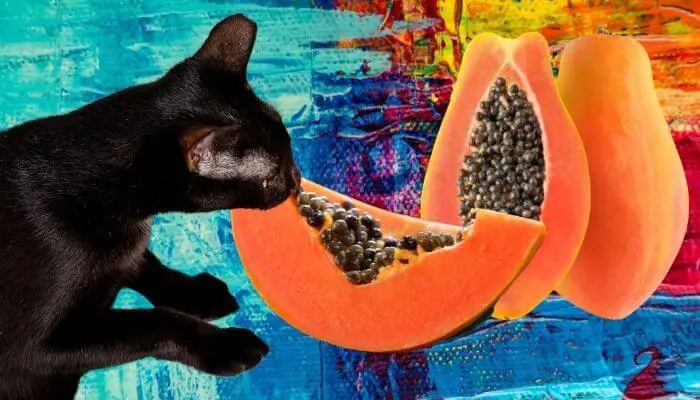

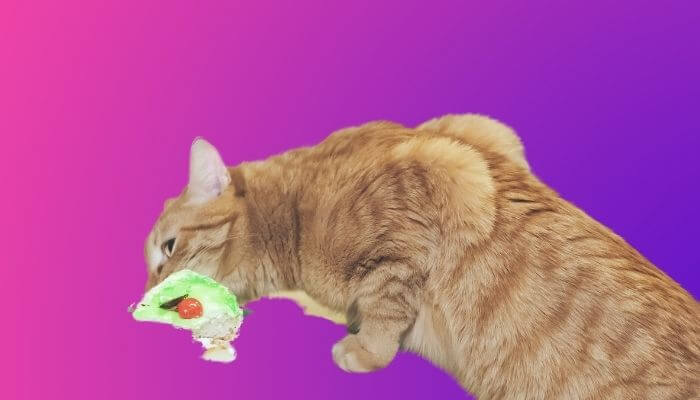
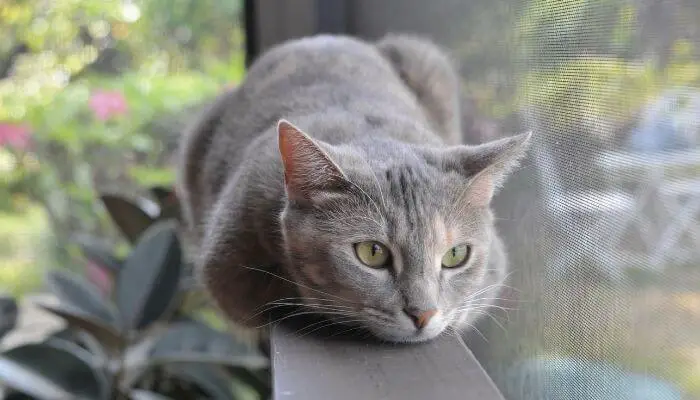
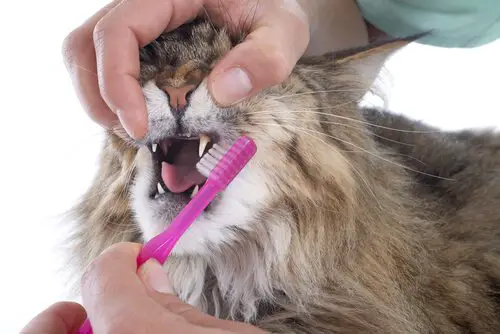
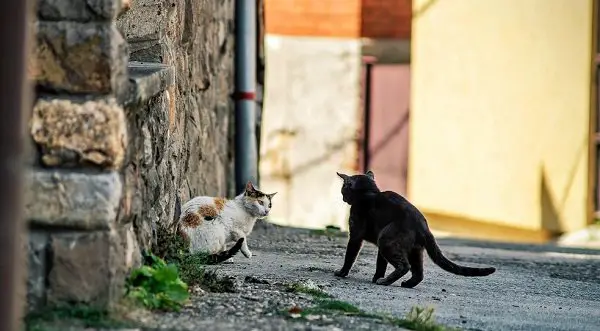
Leave a Comment